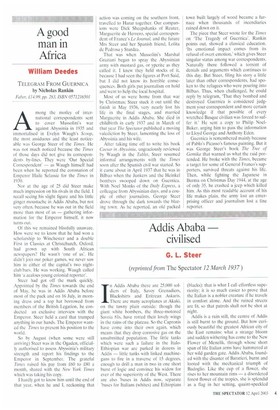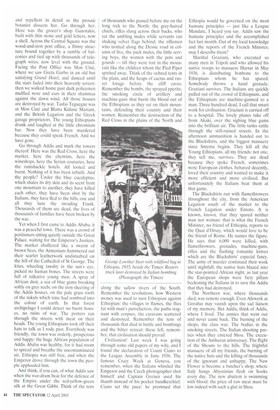Addis Ababa — civilised
G. L. Steer
(reprinted from The Spectator 12 March 1937)
InAddis Ababa there are 25,000 soldiers of Italy, Savoy Grenadiers, Blackshirts and Eritrean Askaris. There are many aeroplanes at Akaki, on the tawny plain outside: though the giant white bombers, the three-motored Savoia 81s, have rotted their lovely wings in the rains of the plateau. So the Capronis have come into their own again, which means that they drop corrosive gas on the unsubmitted population. The little tanks which were such a failure in the haloEthiopian war are parked in dozens in Addis — little tanks with linked machineguns to fire in a traverse of 15 degrees, enough to drill a man in two in one short burst of logic and convince his widow for ever of the superiority of the West. There are also 'buses in Addis now, separate 'buses for Italians (whites) and Ethiopians
(blacks): that is what I call effortless superiority: it is so much easier to prove that the Italian is a nobler creature if he travels in comfort alone. And the ruined streets are lit, so that patrols shall not be shot at night.
Addis is a ruin still, the centre of Addis is still burnt to the ground. But how curiously beautiful the greatest African city of the East remains: what a strange bloom and sudden withering has come to the New Flower of Menelik, through whose short span of life Italian arms have hammered at her wild garden gate. Addis Ababa, founded with the disaster of Baratieri, burnt and looted with the mechanical triumph of Badoglio. Like the cup of a flower, she rises to her mountain rims — a disordered forest flower of the tropics, she is splendid as a flag in her setting, quaint-speckled and repellent in detail as the prosaic botanist dissects her. Go through her. Here was the grocer's shop Ganotakis, built with thin stone and gold letters, now a shell. Across the Central Square was the wood-and-iron post office, a flimsy structure bound together by a ramble of balconies and tied up with thousands of telegraph wires, now level with the ground. Facing the Post Office was Mon Cine, where we saw Greta Garbo in an old but satisfying Grand Hotel, and danced until the stars faded into their heavenly screen: then we walked home past dark policemen muffled nose and ears in their shammas against the dawn wind. All those houses are destroyed by war. Tasfai Teguegne was at Mon Cine and Blatta Kidane Mariam, and the British Legation and the Greek garage proprietors. The young Ethiopians drank and laughed at the little chromium bar. Now they have been murdered because they could speak French. And we have gone.
Go through Addis and mark the towers thereof. Here was the Red Cross, here the market, here the chemists, here the wineshops, here the Syrian couturier, here the ramshackle hotels. All looted and burnt. Nothing of it has been rebuilt. And the people? Under the blue eucalyptus, which shales its dry skin and its scent from one mountain to another, they have killed each other, they have been shot by the Italians, they have fled to the hills, one and all they hate the invading Frank. Thousands of them are dead, the lives of thousands of families have been broken by the war.
Yet when I first came to Addis Ababa, it was a peaceful town. There was a crowd of petitioners sitting quietly outside the Great Palace, waiting for the Emperor's Justices. The market chaffered like a swarm of brown bees, the Armenians hammered out their scarlet leatherwork undisturbed on the hill of the Cathedral of St George. The kites, wheeling tawdry in the sun's eye, picked no human bones. The streets were full of talkative young men. A spray of African dust, a sea of blue gums breaking softly on grey reefs: on the iron sheeting of the Addis houses, on the pale grass roofs of the tukuls which time had sombred into the colour of earth. In that forest archipelago I could detect no burnt houses, no ruins of war. The porters ran through the streets with meat on their heads. The young Ethiopians took off their hats to talk as I rode past. Everybody was friendly, the town was orderly, prosperous and happy: the huge African population of Addis Ababa was healthy, for it had room to spread and breathe the uncontaminated air. Ethiopia was still free, and when the Emperor drove through the town the people applauded him.
And think, if you can, of what Addis saw when the war-drum beat for the defence of the Empire under the red-yellow-green silk at the Great Gibbi. Think of the tens of thousands who passed before me on the long trek to the North: the grey-haired chiefs, rifles slung across their backs, who sat the ambling mules while servants ran shaking velvet flags behind: the riflemen who trotted along the Dessie road in column of five, the pack mules, the little serving boys, the women with the pots and gourds — till they were lost in the mountain like the children whom the Pied Piper spirited away. Think of the ochred tents in the plain, and the heaps of cactus and russet forage before the cliff caves. Remember the bombs, the sprayed yperite, the smoking circle of artillery and machine-guns that burnt the blood out of the Ethiopians as they sat on their mountains, defending their country and their women. Remember the destruction of the Red Cross in the plains of the North and along the sallow rivers of the South. Remember the revolutions. how Western money was used to turn Ethiopian against Ethiopian: the villages in flames, the flies fat with man's putrefaction, the paths stagnant with corpses, the caravans scattered and destroyed. Remember the tens of thousands that died in battle and bombings and the bitter retreat: these fell, remember, that civilisation should prevail.
Civilisation! Last week I was going through some old papers of my wife, and I found the declaration of Count Ciano to the League Assembly in June 1936. The famous Crazy Week at Geneva, you remember, when the Italians whistled the Emperor and the Czech photographer shot himself and Captain Greiser used his thumb instead of his pocket handkerchief. Ciano set the pace: he promised that
Ethiopia would be governed on the most humane principles — just like a League Mandate, I heard you say. Addis saw the humane principles and the accomplished fact last month. Out of my local knowledge and the reports of the French Minister. may I describe them?
Marshal Graziani, who executed so many men in Tripoli and who allowed his native troops to massacre Harrar in May 1936, is distributing bonbons to the Ethiopians whom he has spared. Somebody throws a hand grenade. Graziani survives. The Italians are quickly pulled out of the crowd of Ethiopians, and the Ethiopians are machine-gunned to a man. Three hundred dead. I call that smart work for civilisation. Graziani is carried off to a hospital. The lovely planes take off from Akaki, over the sighing blue gums into the brilliant air. The little tanks rattle through the still-ruined streets. In the afternoon ammunition is handed out to the Blackshirts, and the biggest massacre since Smyrna begins. They kill all the Young Ethiopians, all my friends: not one, they tell me, survives. They are dead because they spoke French, sometimes wore European clothes, behaved decently, loved their country and wanted to make it more efficient and more civilised. But unfortunately the Italians beat them at that game.
The Blackshirts run with flamethrowers throughout the city, from the American Legation south of the market to the French Legation under Entoto. It is known, known, that they spared neither man nor woman: that is what the French Minister, no friend of Ethiopia, reports to the Quai d'Orsay, which would love to be the friend of Rome. He names the figure. He says that 6,000 were killed, with flamethrowers, grenades, machine-guns, rifles and the flashing romantic knives which are the Blackshirts' especial fancy. The army of murder continued their work until nightfall; the native huts blazed into the star-pointed African night, as last year the European shops were fiery pillars beckoning the Italians in to save the Addis that they had destroyed.
The Northern war, where thousands died, was remote enough. Even Afewerk at Gorahai may vanish upon the sad liaison of my memory. But Addis, think of Addis. where I lived. The armies that went out and never came back. The burning of the shops, the class war. The bodies in the smoking streets. The Italian shooting parties when they entered Shoa. The execution of the Amharan aristocracy. The flight of the Shoans to the hills. The frightful massacre of all my friends, the burning of the native huts and the killing of thousands of the ignorant and unhappy. The New Flower is become a butcher's shop, where Italy hangs Abyssinian flesh on hooks every day. The new abattoir is swimming with blood; the price of raw meat must be low indeed with such a glut in Shoa.



































































 Previous page
Previous page